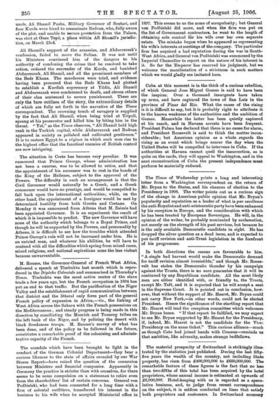The material prosperity of Switzerland is strikingly fling- trated by
the statistics just published. During the last fifty- five years the wealth of the country, not including State property, has risen from £400,000,000 to £680,000,000. The remarkable feature of these figures is the fact that no less than two-fifths of this total has been acquired by the hotel proprietors, whose annual income is estimated at upwards of £6,000,000. Hotel-keeping with us is regarded as a specu- lative business, and, to judge from recent correspondence on the subject, it is seldom conducted on lines that satisfy both proprietors and customers. In Switzerland economy and efficiency are probably combined to a greater extent than anywhere else, as may be inferred from the constant influx of tourists and the results set forth in the statistics given above. The secret of this success is an open one. Swiss hotel-keepers make their business the study and science of a lifetime. In this context we may note that while England still contributes largely to swell the profits of Swiss hotels, she is steadily losing ground in her trade with Switzerland. According to the British Minister's Report, out of 27,349 foreign commercial travellers who visited Switzerland in 1902, only thirty-six represented English firms, the majority being Germans. English firms, it seems, still send price-lists pub- lished in English, with English weights, measures, and money, while the Gorman houses have their catalogues printed in German, French, and Italian, with the prices given in francs. Furthermore, the English commercial traveller is seriously handicapped by his imperfect knowledge of foreign tongues. In other words, it is not "unfair competition" that has ousted British trade, but lack of intelligence and education.



































 Previous page
Previous page